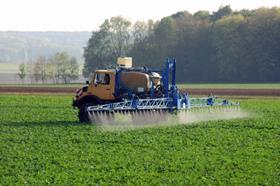
The European Parliament is set to vote on a resolution to support a 15-year ban on glyphosate, described by the World Health Organisation as a “probable” carcinogen.
Glyphosate is an active ingredient in Monsanto’s RoundUp weedkiller, as well as a range of other agrochemical products from companies including Dow and Syngenta. Its licence renewal was met with resistance from Members of the European Parliament, especially those from Italy, France, Sweden and the Netherlands.
The original March vote was deferred due to a difference of scientific opinion, the European Food Safety Authority (Efsa) declaring the product safe in spite of the WHO’s warnings.
The UK’s National Farmers’ Union (NFU) has urged growers to contact their MEPs to stress the importance of glyphosate to their businesses, not least regarding yields.
However, voices in support of the WHO’s stand have not been lacking. Volkert Engelsman of organics specialist Eosta, sees this vote as “crucially important”.
“This ingredient is an endocrine disruptor, meaning that it interferes with an organism’s hormonal system,” says Engelsman. “How can you prioritise its effect on yield when it destroys soils and biodiversity, contributes to climate change and may cause cancer?”
Consumers drive change
Engelsman sees this vote as part of a movement for increased sustainability, transparency and accountability that is driven by consumers.
“This is coming from the public,” he says, “especially trendsetters who are becoming more and more concerned and increasingly active. Consumers are worried about the health of bees and the systemic use of chemicals. People are fed up with the system.”
Global movement SomeOfUs has encouraged its followers to write to their MEPs. “Remind our MEPs they are accountable to us, not Monsanto,” an online petition states. “End glyphosate’s licence in Europe now.”
A survey conducted by Yougov found that two-thirds of Europeans currently support a ban on glyphosate.
Right direction
Engelsman fears that the Efsa has suffered a serious loss of credibility in taking its position. “This is actually quite worrying,” says Engelsman. “They are an organisation that’s supposed to be looking out for the public, but they do no independent research – all their information comes from the food industry.”
Although he sees the problem as systemic, Engelsman believes we as a planet are finally heading in the right direction.
“How do we end up in an economy that allows profit to take precedence over everything?” he asks rhetorically. “We clearly have to redefine profit. If you simply externalise all your costs, that is cheating, and you actually run a risk in terms of your company’s valuation. The big four accountants are increasingly including these externalities, so things are now moving in the right direction.”
The final decision on glyphosate’s licence renewal will be taken by the European Commission, meaning that the vote by the European Parliament will not in fact be legally binding.



